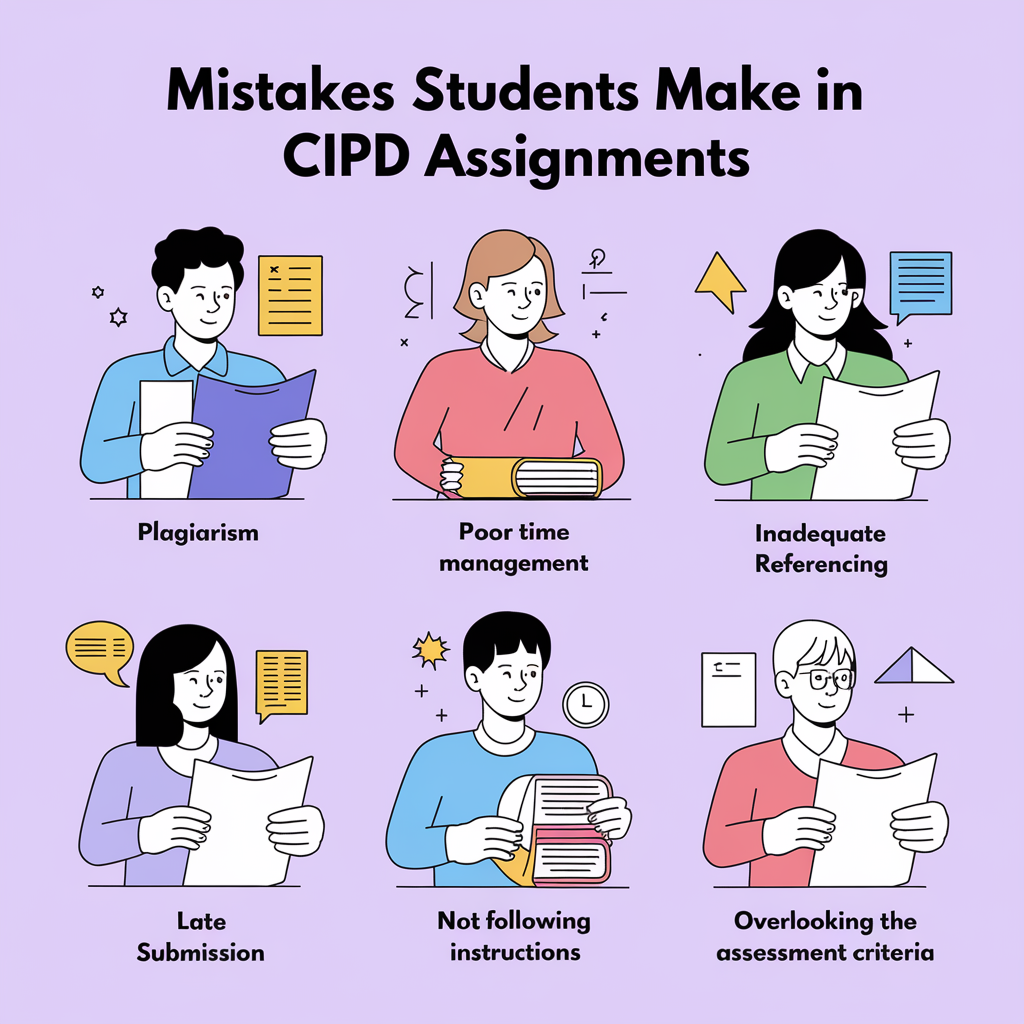Many students encounter common pitfalls that can impact their grades and learning experience while studying CIPD.
Let’s highlight students’ most frequent mistakes in CIPD assignment writing and provide practical strategies to ensure well-structured, insightful, and high-quality submissions.
Common Mistakes and How to Avoid Them
1. Lack of Clear Structure
A well-structured assignment enhances clarity and logical flow, making it easier for readers to follow arguments. Many students fail to plan their tasks properly, leading to disorganized content that lacks coherence.
How to Avoid It:
- Plan before writing: Outline your assignment using a logical structure:
- Introduction – Define the topic and state objectives.
- Main Body – Break down ideas using clear headings and subheadings.
- Conclusion – Summarize key findings and suggest implications.
- Use signposting: Guide the reader through transitions between sections.
- Follow CIPD guidelines on structure and formatting [source].
Example:
Instead of writing a long paragraph discussing HR policies, break it down into sections such as “Legal Compliance,” “Employee Engagement,” and “Best Practices” to improve readability.
2. Weak Analysis and Argumentation
Many students simply summarize theories rather than critically apply them. CIPD assignments require students to analyze HR concepts, evaluate real-world applications, and provide evidence-based solutions.
How to Avoid It:
- Apply theoretical models (e.g., Maslow’s Hierarchy of Needs, Herzberg’s Motivation Theory) to workplace scenarios.
- Use case studies and HR reports to support claims.
- Critically compare perspectives instead of just describing them.
Example:
Weak analysis: “Employee motivation is important for productivity.”
Strong analysis: “Herzberg’s Two-Factor Theory suggests that salary alone does not increase motivation; intrinsic factors such as career growth and recognition play a vital role (Herzberg, 1959).”

3. Poor Referencing and Citation Errors
Citing sources incorrectly or failing to reference them can lead to plagiarism, a serious academic offense. Many students lose marks due to improper formatting or missing references.
How to Avoid It:
- Follow the correct referencing style (CIPD typically uses Harvard or APA).
- Use citation management tools such as EndNote, Mendeley, or Zotero [source].
- Ensure in-text citations match the reference list at the end.
Example:
Incorrect citation: (Smith, 2020, p. 45) – APA style does not require page numbers for paraphrased text.
Correct citation (APA 7th Edition): (John, 2020)
4. Insufficient Research and Limited Use of Sources
Relying only on textbooks or lecture notes weakens the depth of analysis. CIPD assignments require evidence from peer-reviewed journals, HR case studies, and official reports.
How to Avoid It:
- Use Google Scholar, CIPD Knowledge Hub, and HR journals for credible sources [source].
- Cross-check information from multiple references.
- Incorporate recent studies (preferably from the last five years).
Example:
For a more robust argument, instead of citing only one book on HR practices, include real-world HR reports from organizations like Deloitte, McKinsey, or CIPD research papers.
5. Overlooking Assignment Instructions and Learning Outcomes
Many students misinterpret the question or fail to align their responses with learning objectives, leading to irrelevant content.
How to Avoid It:
- Carefully read the assignment brief and highlight key requirements.
- Identify action verbs (e.g., analyze, evaluate, compare) to understand the level of depth required.
- Check the marking rubric to meet the assessment criteria.
Example:
If a question asks to “evaluate HR strategies,” merely listing HR strategies will not be enough. You must compare, contrast, and assess their effectiveness based on evidence.
6. Weak Critical Thinking and Lack of Originality
Some students focus too much on descriptive writing rather than critical thinking. CIPD assignments demand a balanced argument, not just repeating information from textbooks.
How to Avoid It:
- Challenge assumptions and present multiple viewpoints.
- Provide a well-argued conclusion rather than just summarizing facts.
- Use practical workplace examples to demonstrate original thinking .
Example:
Instead of stating: “Diversity in the workplace is beneficial,”
Provide evidence-based arguments: “While diversity enhances creativity (McKinsey, 2021), organizations may struggle with cultural integration if proper HR strategies are not implemented (CIPD, 2022).”
7. Poor Time Management and Procrastination
Last-minute writing often results in poor-quality work, spelling errors, and a lack of depth in analysis.
How to Avoid It:
- Break down the assignment into smaller tasks with deadlines.
- Use time management tools like Trello or Todoist.
- Allocate time for proofreading and revisions before submission.
Example:
Instead of writing an entire assignment in one day, set milestones like:
- Week 1: Research & outline
- Week 2: Draft main sections
- Week 3: Revise, proofread, and format references
8. Failure to Learn from Past Mistakes
Repeating previous errors hinders academic growth and prevents skill development.
How to Avoid It:
- Review feedback from tutors and identify recurring mistakes.
- Maintain a learning journal to track improvements.
- Seek guidance from academic support services or tutors.
Example:
If previous feedback indicates “weak analysis,” focus on improving argument depth by incorporating real-world applications and comparative viewpoints in future assignments.
Failure to Follow Word Count
Exceeding or failing to meet the word count can result in penalties, reflecting an inability to present ideas concisely or comprehensively.
How to Avoid It:
- Check word limits carefully before starting.
- Prioritize key points and avoid unnecessary repetition.
- Editing tools like Grammarly can be used to refine content.
Example:
If an assignment requires 1,500 words, but a draft has 2,000 words, trim redundant sentences without losing essential analysis. If it’s too short, expand ideas with supporting evidence.
Conclusion
Students can significantly enhance their CIPD assignments, improve their grades, and develop valuable HR management skills by avoiding these common mistakes. Implementing a clear structure, strong research, critical thinking, and effective time management will set you up for success in your CIPD studies.
Additional Resources
- CIPD Knowledge Hub: www.cipd.co.uk – Research papers, case studies, and HR guidelines.
- Academic Writing Guides: Purdue OWL, Harvard Referencing Guide.
- Plagiarism Detection Tools: Turnitin, Grammarly, or Copyscape for originality checks.









 Evan John
Evan John